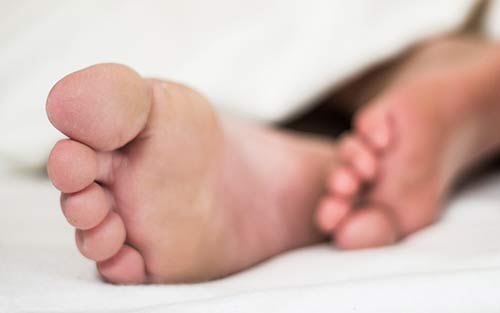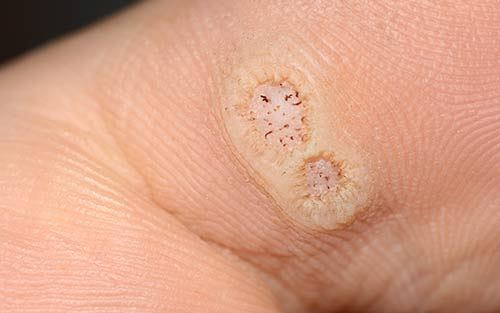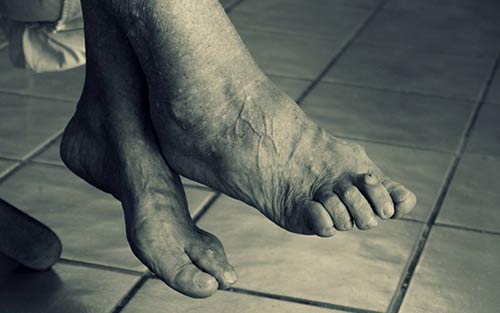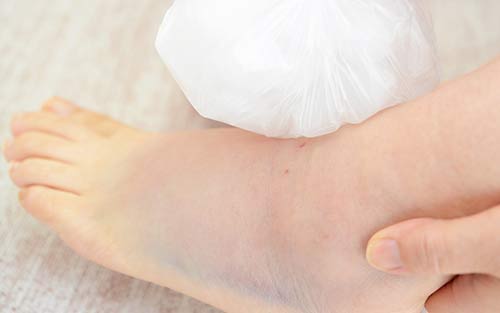Prevent your foot stiffness from slowing you down and causing significant discomfort. By knowing why your feet uncomfortably stiffen up, you can take steps to keep them limber and pain-free.

yourfootpalace.com gathered information about why your feet get stiff after sleeping or sitting for extended periods, and what you can do to ease this discomfort.
Why Do My Feet Hurt in the Morning?
When your feet hurt in the morning or after sitting for long periods, it is a sign that something has gone awry. If that pain is frequent, excruciating, and leaving you debilitated, seek medical attention immediately. Otherwise, here are several possible reasons for your foot stiffness:
1 – Plantar Fasciitis
Foot stiffness after sitting and in the morning is a common symptom of plantar fasciitis. The plantar fascia is a thick ligament on the bottom of your foot, running from the heel to the ball. This condition occurs when that ligament becomes irritated.
Plantar fasciitis is common for athletes, specifically runners. Wearing proper footwear and replacing your shoes every 400 to 500 miles can help prevent overuse pain. Other contributing factors are flat feet, rapid weight gain, and obesity.
If your discomfort is due to plantar fasciitis, it will usually take a few minutes of activity to warm up the area and relieve the pain.
Read more about plantar fasciitis pain relief at yourfootpalace.com/how-foot-massage-can-relieve-your-plantar-fasciitis-pain/
2 – Plantar Fascia Rupture
This excruciatingly painful condition can lead to stiffness during and long after the healing process. While rare, this condition can occur during high impact exercises or in those with chronic plantar fasciitis.
Treatment and recovery for a ruptured plantar fascia may include partial or complete immobilization of the foot, with normal standing or walking being possible within a few weeks.
3 – Plantar Warts (Verruca Plantaris)
Plantar warts can cause significant discomfort and are caused by a virus that specifically infects superficial layers of skin. When it occurs on the bottom of the foot, the virus will grow within the layer of skin (not protruding like other warts).

This is a virus, and there’s no oral medication to stop its occurrence. The virus must be treated at the infection site. Treatment may include topical acid preparations, freezing, injectable medications, and/or removal.
Plantar wart removal can be done in many ways, utilizing cautery agents, and/or laser removal techniques. However, whichever way your wart is removed, it can reoccur and spread.
Prevent plantar warts through good foot hygiene, limiting barefoot exposure outside, and disinfecting bathroom floors and shower basins.
4 – Rheumatoid Arthritis (RA)
Those with rheumatoid arthritis are at increased risk of developing plantar fasciitis, resulting in stiff feet in the morning or after long periods sitting (see #1 above).

Rheumatoid arthritis typically causes accompanying symptoms like inflammation, swelling, and pain in the wrists and hands, as well as the feet.
If you suspect rheumatoid arthritis is causing your discomfort, you may want to consult a rheumatologist. Rheumatologists are specialists that deal with arthritis and diseases involving bones, muscles, and joints.
5 – Achilles Tendinitis
The Achilles tendon is a band of tissues connecting the calf muscle to the heel bone. When this tendon becomes inflamed, it can result in Achilles tendinitis or stiffness and pain in the heel. Symptoms can be worse in the morning due to limited circulation while at rest.
If you have Achilles tendinitis, pain or discomfort may be felt throughout the day as well. Consult your primary care physician for advice on pain relief or seek a physiatrist (a doctor specializing in sports medicine or physical and rehabilitative medicine).
6 – Hypothyroidism
This condition results in the disruption of chemical and hormone balance in the body. Subsequently, this hypothyroidism can lead to inflammation, swelling, and discomfort in the feet, ankles, and heels.
Other symptoms of this condition include muscle weakness, depression, constipation, memory loss, among others. If you suspect you are dealing with hypothyroidism, consult your primary care physician for diagnosis and treatment.
Read more about hypothyroidism at thyroid.org/hypothyroidism/
7 – Bursitis
Bursas are fluid-filled sacs cushioning bones, tendons, and muscles near large joints in the body. They’re found in the hips, shoulders, elbow, and places like the heel and big toe of the foot.
Bursas in the foot can become inflamed due to excessive repetitive motion like walking, running, or jumping. Other causes of bursitis include injury or trauma to the affected area, inflammatory arthritis such as rheumatoid arthritis, gout, and infection.
Treatment typically involves resting the area and protecting it from further trauma. In most cases, bursitis pain and discomfort goes away within a few weeks with proper treatment. Recurrent flare-ups of bursitis are common.
Consult your doctor if you are experiencing disabling joint pain or an inability to move a joint, especially if symptoms are accompanied by a fever. A fever is a strong indication of infection.
8 – Parkinson’s Disease
Parkinson’s disease can cause muscle stiffness, discomfort, and significant difficulties initiating movement, including walking, speaking, and writing. The condition is accompanied by tremors, which may not be noticeable in its beginning phases.
If you are experiencing problems with coordinated body movement, involuntary body movements, evening time confusion, and dizziness, you should consult your primary care physician. However, if Parkinson’s is suspected, you will likely be referred to a movement disorder specialist – a neurologist with training to detect conditions like Parkinson’s.
For more information about Parkinson’s disease, visit yourfootpalace.com/parkinsons-disease-symptoms-diagnosis-stages-treatment/
9 – Stress Fracture
Stress fractures in your foot (usually the heel) can cause stiffness and increasing discomfort over time if not treated. Stress fractures are typically the result of intense athletic activity, overuse, change in surface, improper shoes, or poor technique.
A stress fracture might go unnoticed when it occurs, but pain and swelling can develop over days or weeks and eventually leave you in pain throughout the day with difficulties walking.

Stress fractures usually heal on their own with reduced physical activity and protective footwear. If you suspect you have sustained a stress fracture, consult your doctor as soon as possible for diagnosis and treatment.
10 – Neuropathy
Stiff feet in the morning can result from problems in the nervous system and signal sense of the brain (neuropathic ideology). Among other diseases, diabetes, multiple sclerosis, and vascular problems can contribute to this condition.
Neuropathy pain is described as a burning sensation. Affected areas can be sensitive to the touch. Common symptoms of neuropathic pain may include intolerable pain, pins and needles, difficulty sensing temperatures, and numbness.
If you suspect neuropathy is causing stiffness in your feet, consult a podiatrist, your family physician, or a neurologist for an accurate diagnosis and treatment plan.
Read more about neuropathy pain and relief at yourfootpalace.com/how-massage-relieve-your-peripheral-neuropathy-pain/
Treatment for Stiff Feet
Besides buying better-fitting shoes, the following forms of treatment can help ease mild or moderate stiffness and discomfort in the feet:
Apply Ice – Freeze a few water bottles. When you get up in the morning, wrap a bottle in a towel and roll it gently from the ball of your foot to the heel and back, repeating this for a few minutes.
Stretch – Stretches work to loosen muscles and tendons and, when practiced daily, can improve one’s health and wellness significantly. The following heel and arch stretch can help relieve foot stiffness and relax tense muscles:
- At arm’s length from a wall, step back with your right foot and bend your left knee, keeping both feet and heels on the ground.
- Slowly lean forward as far as you can as you stretch.
- Hold the position for 10 seconds, then relax.
- Switch feet and repeat.
Watch this video for more easy stretching for your feet.
Massage – Massaging your feet is synonymous with self-care. Consider the following:
- Hold your foot in your hand and apply gentle pressure along the top and bottom of the foot and heel area with your thumb.
- Roll a tennis ball along the bottom of your foot back and forth from toes to heel.
- Schedule a reflexology foot massage.
If you are experiencing sharp or sudden pain, or your condition lasts longer than two days, consult your doctor. Sharp and sudden pain may be an indication of a more severe condition and should be addressed immediately.
My Feet Hurt When I Wake Up and After Sitting
In this article, you discovered conditions that can cause your feet to stiffen while resting or sitting, how to relieve tension in your feet, and when to seek medical attention.
By addressing the stiffness in your feet, you can keep them free from discomfort and pain, maintain your mobility, and boost your sense of health and wellness.
Ignoring abnormalities like stiffness, discomfort, and pain in your feet can exacerbate underlying health problems, and lead to the need for costly medical treatment.
Sources:
cedars-sinai.org/health-library/diseases-and-conditions/p/plantar-fasciitis.html
diabetes.org/diabetes/complications/neuropathy
orthoinfo.aaos.org/en/diseases–conditions/stress-fractures-of-the-foot-and-ankle/
rheumatology.org/I-Am-A/Patient-Caregiver/Diseases-Conditions/Rheumatoid-Arthritis
foothealthfacts.org/conditions/plantar-wart-(verruca-plantaris)
mayoclinic.org/diseases-conditions/bursitis/symptoms-causes/syc-20353242
(706) 521-5290
(678) 963-5958
To view the original version on Foot Palace, visit: https://www.yourfootpalace.com/stiff-feet-in-morning-and-after-sitting/
No comments:
Post a Comment
Note: Only a member of this blog may post a comment.